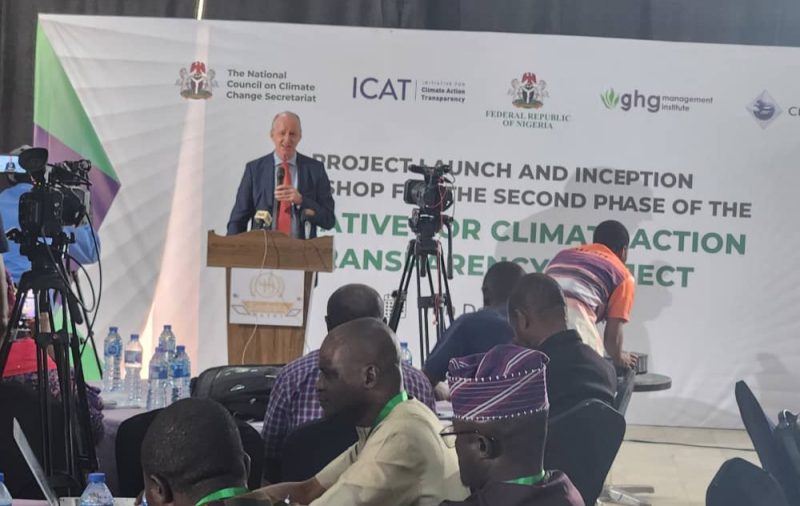Nigeria has announced the second phase of its Initiative for Climate Action Transparency (ICAT) project to encourage more openness in the pursuit of the nation’s climate efforts.
As a signatory to the Paris Climate Agreement, Nigeria is obligated to implement the Enhanced Transparency Framework (ETF), one of the key pillars of the accord, which provides for accurate and reliable reporting of Parties’ Nationally Determined Contributions (NDCs).

Dr Henning Wuester, Director of ICAT in Bonn, Germany, speaking at the podium during his opening remarks at the project launch in Abuja
In order to guarantee the achievement of this objective, ICAT is supporting the country in developing and operating the Monitoring, Reporting, and Verification (MRV) process of the Agreement.
A few ICAT phase I project milestones
For that reason, the first phase of this scheme witnesses the establishment of a strong institutional arrangement across three priority sectors of the NDCs: oil and gas, Agriculture, and Forest and Other Land Use (AFOLU); and also the transport sector, which includes roads, water, and air.
Assessment of policies and measures to develop indicators for tracking the implementation of the NDC was also carried out during this phase of the exercise.
Developing institutional arrangements entails identifying sub-sectors, building capacity, and defining the roles and responsibilities of individuals who will execute the MRV system. This necessitated widespread engagement and the use of stakeholder mapping to identify all of the persons in charge of implementing this assignment and the development of a document that will guide them in their reporting method, all of which were accomplished throughout the pilot stage of this significant venture.
External support, challenges, next steps
The European Union is also helping Nigeria in establishing a robust MRV structure in the power and waste sectors, which are under ICAT’s purview. Nonetheless, one important sector, Industrial Processes and Product Use (IPPU), continues to lack this institutional framework on the ground.
“So, ICAT is graciously supporting Nigeria in phase II of this project to create institutional arrangements in the industry sector, which completes the five priority sectors,” Dr. Bala Bappa, the ICAT in-country facilitator and coordinating consultant, stated during the project launch and inception workshop organised by the National Council on Climate Change (NCCC) in Abuja on Wednesday, December 11, 2024.
He went on to explain that now that Nigeria has this institutional setup in place, the next step to be taken in the second part of the project is to develop guidelines that will support the implementation of the MRV.
These guidelines, the in-country consultant continued, would specify the exact roles and responsibilities of each stakeholder, including the MDAs, private sector, and sub-national.
Another essential component of this phase of the strategy, according to Dr Bappa, is addressing how to begin operationalising the Greenhouse Gas Management Inventory System, “because that is where you will receive the data, analyse it, and then archive it.”
Dr. Nkiruka Maduekwe, director general of the National Council on Climate Change (NCCC), stated in her remarks at the event that “this is a very important process for Nigeria, which is why you are here, so we ask you to take ownership of it.”
As she stormed the premises with hard copies of the CCA 2021 and distributed them to the participants in the hall, the council chieftain underlined the importance of understanding the Act, which will allow them to carry out their numerous obligations and support the overall attainment of the programme’s purpose by asking the appropriate questions when necessary.
Wrapping up her comments, she assured the audience that the NCCC, in keeping with her role in the collaboration, will continue to interact with stakeholders at every stage of the project’s life cycle to assure its successful completion.
MDAs, international development partners, private sector players, NGOs, and academia all held technical sessions during the meeting to evaluate key priorities in the Nigeria ICAT project phase II work plan, such as the implementation strategy, stakeholder consultations, report analysis, and presentation.
By Etta Michael Bisong, Abuja
